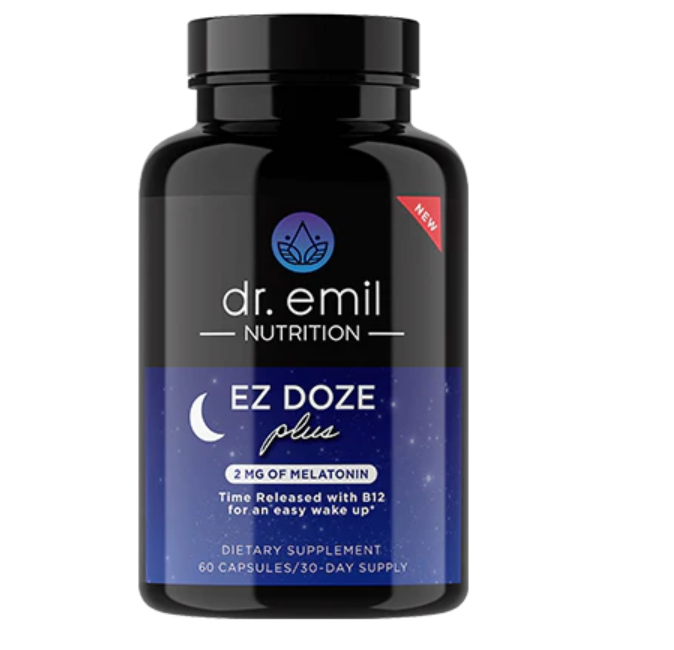When you’re staring at the ceiling at 2 a.m. and can’t fall asleep, there are a million things running through your head… how you better get to sleep soon or you’ll be exhausted for that big presentation, all of the things you might have done differently to be sleepier right now. It can be tempting to reach for your phone to start scrolling, or to just get up and try to get something done on no sleep at all.
Or you might find yourself reaching for melatonin – that handy little over-the-counter remedy that promises sweet dreams all night long, without restless wakeups throughout the night. And it’s true, melatonin can help you get a healthy night’s sleep… but as with may supplements, more isn’t always better.
In fact, one of the most common questions doctors get about melatonin is: how much melatonin is too much?
This is a surprisingly tricky question because melatonin is not like aspirin or ibuprofen, where there’s a clear dosage printed on the box that applies to most people. Instead, the “right” dose depends on the individual, and what counts as “too much” can vary.
The good news is that we can break this topic down into clear, practical steps, so you can walk away knowing how to use melatonin wisely and avoid common pitfalls. So brew some relaxing sleepytime tea and turn down the blue light on your phone because we’re breaking down how to find the right melatonin dosage for your best night’s sleep.
https://www.instagram.com/p/CgCQ_dtFs7C/
What Is Melatonin and How Does It Work?
Melatonin isn’t just a pill you buy at the pharmacy — it’s a hormone your body already makes naturally. Here’s how it works to regulate your body’s sleep schedule:
🌃 When it starts to get dark outside, the pineal gland deep inside your brain starts releasing melatonin to signal to your body that hey! It’s nighttime!
😴 The rise in melatonin signals your body it’s time to rest, and you start getting sleepy .
🌄 When the sun comes up and light hits your eyes, melatonin levels drop.
😁 The drop in melatonin signals your body it’s time to wake up, and sleep starts to dissipate. You’re well rested and ready for the day!
This natural rhythm is called the circadian rhythm, or internal body clock, and melatonin is one of its key regulators. But our modern world doesn’t always make it easy for melatonin to do its job. Late-night screen time, stressful work schedules, jet lag, and even age can throw off the body’s natural production.
That’s where melatonin supplements come in.
Melatonin supplements essentially mimic what your body is supposed to be doing on its own. They aren’t like prescription sleeping pills, which knock you out cold. They let you decide when to up the melatonin and start feeling sleepy, like a gentle reminder to your body: hey, it’s bedtime now.
That’s why melatonin can be especially helpful for:
- People struggling with insomnia or delayed sleep onset
- Travelers trying to reset their internal clock after long flights
- Shift workers who need to sleep during the day
- Older adults whose natural melatonin levels have declined with age
Knowing this helps us understand why “too much” melatonin doesn’t necessarily work the way people hope it will. Since it isn’t a sedative, taking more doesn’t always lead to better or faster sleep.
Typical Dosages of Melatonin
One of the most confusing things about melatonin is how widely doses vary. Walk into any drugstore, and you’ll find bottles ranging from 0.3 mg to 20 mg or more.
Unlike prescription medications, supplements like melatonin aren't tightly regulated in the United States, which means supplement companies can sell very high doses even though research shows that most people don’t need that much.
For healthy adults, studies suggest that a little goes a long way. In fact, doses as low as 0.5 mg can be effective, and many people do just fine with 1–3 mg taken 30 minutes to an hour before bed. Higher doses often don’t improve sleep any better — and sometimes cause side effects instead.
Here’s a quick breakdown of typical ranges:
- Adults: 0.5 mg to 5 mg about 30–60 minutes before bedtime
- Older adults: Often respond well to lower doses, sometimes just 0.3 mg to 2 mg
- Children (only with medical guidance): 0.5 mg to 3 mg, depending on age and condition
- Specific cases like jet lag or sleep disorders: Sometimes up to 10 mg, but usually only with a doctor’s oversight
The takeaway here is simple: start low and only increase if needed. If you can fall asleep with 1 mg, there’s no need to jump up to 10 mg just because the bottle offers it!

How Much Melatonin Is Too Much?
Now we arrive at the heart of the question: how much melatonin is actually too much?
The tricky part is that melatonin doesn’t have a clearly defined “toxic” dose. You’re not going to fatally overdose on melatonin the way you could with certain medications. But that doesn’t mean higher doses are harmless. Taking too much melatonin can disrupt your natural circadian rhythm, make sleep problems worse, and cause unpleasant side effects.
Most experts agree that doses above 5 mg are more than most people need.
Anything beyond 10 mg increases the likelihood of side effects without offering additional sleep benefits.
In children and teenagers, even 3 mg may be too much, depending on their size and sensitivity.
So what happens if you overdo it? Here are the most common signs you’ve taken too much melatonin:
- Morning grogginess, sometimes called a “melatonin hangover”
- Headaches
- Stomach upset or nausea
- Dizziness
- Vivid or disturbing dreams and nightmares
- Daytime drowsiness
- Mood changes such as irritability or anxiety
In rare situations, very high doses of melatonin may interfere with other hormone systems, including those related to reproduction and metabolism. That’s why doctors are particularly cautious about long-term high-dose use in young people whose bodies are still developing.
The bottom line is this: more melatonin doesn’t equal better sleep. For most adults, 0.5 to 5 mg is the safe and effective zone.
Factors That Influence Your Tolerance
One reason there isn’t a one-size-fits-all dosage is that people metabolize and respond to melatonin differently. A few key factors influence how much is “too much” for you personally:
- Age. As we get older, melatonin metabolism slows down. This means older adults often need lower doses to feel the same effect.
- Body weight. Heavier individuals may tolerate slightly higher doses, though weight is not the only factor.
- Sensitivity. Some people are extremely sensitive to hormonal changes and feel groggy even after 1 mg. Others need a little more to notice an effect.
- Timing. Taking melatonin too late at night (or worse, in the middle of the night) can shift your circadian rhythm in the wrong direction and leave you feeling worse.
- Other medications. Certain drugs, including antidepressants, blood thinners, diabetes medications, and blood pressure medications, can interact with melatonin. This can either amplify its effects or cause unwanted side effects.
- Underlying health conditions. People with autoimmune conditions, epilepsy, or mood disorders may experience complications with melatonin use, especially at higher doses.
All of this reinforces the importance of starting low and paying attention to how your body responds. What works well for a friend or family member may not be the right dose for you.
Safety Tips for Using Melatonin Wisely
Melatonin can be a very helpful tool for sleep when used correctly. To keep it safe and effective, here are some simple guidelines to follow:
- Start small. Begin with 0.5 mg or 1 mg. Increase only if you really need to.
- Take it at the right time. About 30–60 minutes before your desired bedtime is ideal.
- Avoid relying on it every night long-term. Melatonin is best for occasional sleep issues like jet lag, shift work transitions, or temporary insomnia.
- Check for interactions. If you’re taking other medications or have health conditions, ask your doctor if melatonin is safe for you.
- Pay attention to side effects. If you feel groggy, irritable, or experience weird dreams, that’s a sign your dose may be too high.
- Combine it with good sleep habits. No supplement can replace the basics of sleep hygiene: a dark, cool bedroom, consistent bedtimes, and limited screen use before sleep.
It’s also worth remembering that melatonin works best when your natural circadian rhythm is supported by lifestyle. Getting bright light exposure during the day, avoiding caffeine late in the afternoon, and winding down with relaxing routines all help your body’s natural melatonin work more effectively.
Top Tier Supplements for Getting the Most Out of Your Melatonin

Explore Dr. Emil Nutrition EZ Doze Plus >>
Not all melatonin supplements are created equal. At Dr. Emil Nutrition, all of our supplements are formulated by a doctor to be safe and effective, and our melatonin supplement EZ Doze is no different.
The other thing that sets it apart from other sleep aids on the market is that in addition to a a dose of melatonin that is generally safe and effective for adults – 2mg – it contains time-released B12 to help you shake off any lingering groginess and wake up feeling refreshed. As the melatonin starts to wear off, the B12 starts to kick in.
Vitamin B12 helps with a variety of essential body functions, like keeping blood and nerve cells healthy and making DNA. But it’s also commonly used for energy support because it plays a key role in converting food into energy – helping your body rev up, shake off the melatonin, and get ready for the day ahead.
Looking for a Sleep Aid That Supports Your Weight Loss Goals?
In addition to our all-purpose EZ Doze melatonin supplement, Dr. Emil Nutrition also offers Bedtime Burn, a powerful PM fat-burner that’s free of harsh chemicals you’ll find in other brands. It relies on plant-based compounds like white kidney bean and green tea extract to help reduce nighttime snack cravings and kick your metabolism into high gear, plus it contains calming ingredients like valerian root, passion flower, and of course melatonin to help you get a great night’s sleep so that you’re fresh and refueled for anything tomorrow has in store, whether it’s hitting the gym or just keeping up with your busy lifestyle.
Explore Dr. Emil Bedtime Burn to learn more >>
TLDR; More melatonin won’t necessarily increase your results. It’s a tool, not a cure-all!
So how much melatonin is too much? For most adults, anything above 5 mg is more than necessary, and doses above 10 mg are likely to cause side effects without extra benefit. Children and older adults usually need even less.
The good news is that melatonin is not addictive in the traditional sense. Your body doesn’t become chemically dependent on it the way it might with prescription sleep medications. However, it’s still possible to fall into a dependency-like pattern where you feel you can’t sleep without taking it every night. That’s why it’s best to think of melatonin as a tool, not a cure-all.
If you use it occasionally for jet lag, travel, or a stressful period of insomnia, melatonin can be very effective and safe. But if you find yourself taking it nightly for weeks or months without improvement, it’s worth looking deeper. Persistent sleep problems may point to underlying issues like stress, anxiety, sleep apnea, or poor sleep habits that melatonin alone can’t fix.
The safest strategy is to use the lowest effective dose, combine it with healthy sleep practices, and check in with your doctor if you’re unsure. That way, you’ll reap the benefits of melatonin without crossing into the “too much” territory.






